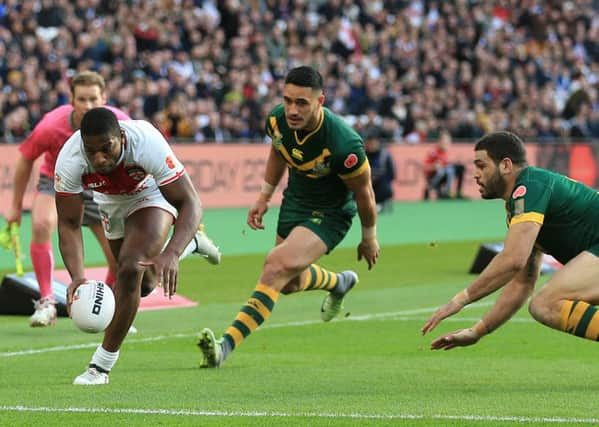England 18 Australia 36


They had taken a brief lead and trailed by only four points at half-time, but a three-try blitz in 12 minutes gave Australia a commanding lead.
Frustratingly, agonisingly, there was a feel of familiarity to this outcome. It was a different cast and a new director, but the same old script.
Advertisement
Hide AdAdvertisement
Hide AdA first-half try by Jermaine McGillvary had put England ahead, but by half-time the Australians had taken a 10-6 lead.
The spectacle was marred by Robert Hicks’ pedantic officiating, particularly in the first-half, though Wayne Bennett’s men only had themselves to blame for criminal errors.
They twice failed to find touch with penalties - NRL players Gareth Widdop and Josh Hodgson both guilty - and in the second-half, their resistance crumbled as Australia blew their lead out to 28-6.
Tries by Widdop and Ryan Hall reeled in their lead during a free-scoring finish, but the six-tries-to-three exchange was a fair reflection of the tourists’ dominance.
Advertisement
Hide AdAdvertisement
Hide AdAnd so England’s wait for a series triumph involving Australia will stretch into a 45th year, and the same old question - and suggested solutions - will be asked. What can they do to close the gap?
The RFL hoped bringing master-coach Wayne Bennett would prove the answer, though the games under his watch offered little evidence of any progress.
He used two halfback combinations in this game - and two different variations previously - to suggest he is still trying to find his best line-up for next year’s World Cup.
Australia, by contrast, had the settled spine in the side which produced smooth, polished attacks and an aura of calmness and control.
Advertisement
Hide AdAdvertisement
Hide AdThey offered little to fear - England were competitive - but they produced a masterclass in ruthless efficiency.
Mal Meninga will take his Green and Gold machine to Liverpool next week for a final against New Zealand, who go into the Anfield decider with a negative for-and-against of -5.
Indeed, the Kiwis’ 18-18 draw with Scotland on Friday - the game of the tournament - had presented England with the straight-forward scenario of needing to win this game to qualify for next week’s final at Anfield.
Bennett threw a curve-ball in selecting ex-Warrior Kevin Brown at stand-off, with George Williams relegated to the bench.
Advertisement
Hide AdAdvertisement
Hide AdJohn Bateman replaced Wigan team-mate Liam Farrell in the left second-row spot.
After an impeccably-observed minute’s silence on Remembrance Sunday, and stirring national anthems, the game kicked off with plenty of fans still filing into the stadium. Supporters complained of long queues at the ticket office and, once inside, the atmosphere was flat - the 35,000 fans were sat too far away from the action.
Australia had the better chances in a tense opening, but England went ahead through Widdop’s boot in the 11th minute.
Kallum Watkins was penalised for a late tackle on kicker Cooper Cronk, giving Johnathan Thurston an easy chance to lock the scores in the 17th minute.
Advertisement
Hide AdAdvertisement
Hide AdThe Kangaroos turned down a chance to kick another penalty moments later, but the England defence held firm under a heavy bombardment on their line, including a brilliant Bateman stop on a jinking Cronk.
Penalties continued to interrupt the match, and when momentum swung England’s way, a neat pass from St Helens full-back Jonny Lomax - a former Orrell St James junior - allowed McGillvary to squeeze over in the corner.
Widdop was unable to convert, but they went close to extending their lead only for centre Percival to spill close to their line.
Helped by the trill of Hicks’ whistle, Australia enjoyed a spell on the hosts’ line and drew level before the break when Blake Ferguson punished a stretched defence. Thurston’s conversion - and a penalty - opened up a four-point lead.
Advertisement
Hide AdAdvertisement
Hide AdEngland started the second-half brightly, but the contrast in the two sides was brutally exposed within minutes. For England, Brown opening up the defence on the right but Sam Burgess spilled Hodgson’s pass - at the other end, Greg Inglis sliced through after Watkins’ earlier spill.
And with Thurston majestic with the boot, it gave the Kangaroos a 16-6 lead.
Williams came off the bench to replace Brown, but before he had touched the ball the Kangaroos had extended their lead after Matt Scott ploughed through four defenders. Thurston’s goal made it 22-6.
Bateman had been one of England’s better players, a niggly menace in defence, but he was taken off before the hour-mark - and the Roos punished that edge through Josh Dugan’s try.
Advertisement
Hide AdAdvertisement
Hide AdWiddop pulled a try back to get England into double-figures but it only stemmed the bleeding for a spell, with Matt Gillett’s determined try opening up a 20-point margin. In their try celebrations, captain Sam Burgess punched David Klemmer but referee Hicks decided not to produce a card.
Ryan Hall continued his remarkable record of averaging a try for every Test he plays - 31 in 31 - to add a little credibility to the final score, even if Australia had the final say through the fabulously-named Valentine Holmes.
England: Lomax; McGillvary, Watkins, Percival, Hall; Brown, Widdop; Hill, Hodgson, Graham, Bateman, Whitehead, S Burgess. Subs: T Burgess, G Burgess, Cooper, Williams.
Australia: Boyd; Holmes, Inglis, Dugan, Ferguson; Thurston, Cronk; Scott, Smith, Woods, Cordner, Gillett, Merrin. Subs: Klemmer, Morgan, Frizell, Thaiday.
Half-time: 6-10
Attendance: 35,569